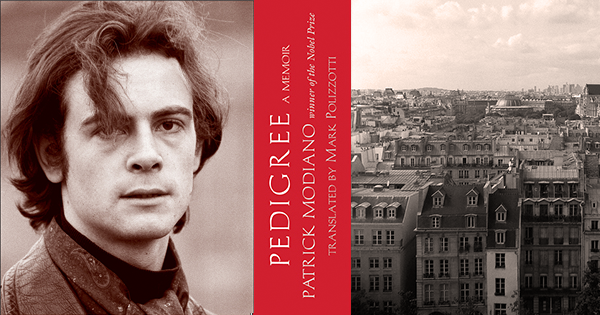
Last year, Patrick Modiano was awarded the Nobel Prize in Literature “for the art of memory with which he has evoked the most ungraspable human destinies.” Almost without exception, his stories take place in the aftermath of the German occupation of France, with Paris as a locus for his circling meditations on memory and identity.
In Pedigree, Modiano turns the lens back on himself. Of the title, Modiano writes, “I’m a dog who pretends to have a pedigree … straining to find a few markers, a few beacons in this quicksand.” This slim volume recounts the first 21 years of the writer’s life in postwar Paris. Though Modiano self-effacingly writes that he has “no interest in soul-searching or self-reflection,” blurry mirror images from his fiction emerge from the memories recounted here.
I was a boarder at the Montcel school until 1960. Four years of military-style discipline. Every morning, flag salutes. Parade marches. Company, halt. Stand at attention. Evening inspections of the dormitories. Bullying by a few senior-year “captains” charged with maintaining “order.” Electric clamor of the morning alarm. Showers in batches of thirty. Fitness trail. At ease. At attention. And the hours spent gardening, when, in a row, we raked up the dead leaves.
One of my classmates that year was named Safirstein. He was with me in the green dormitory. He told me that his father had been a medical student in Vienna when he was twenty. In 1938, at the time of the Anschluss, the Nazis had humiliated Vienna’s Jews by forcing them to wash the sidewalks and paint the Star of David on the windows of their shops themselves. His father had suffered this bullying for a time, then fled Austria. One night, we decided to go explore inside the blockhouse at the far end of the park. This meant crossing the great lawn, and if one of the staff spotted us we could be severely punished. Safirstein had refused to join in this scouting expedition. The next day, my classmates ostracized him and called him a “chicken,” with that garrison-style boorishness that emerges when “the men” are among themselves. Safirstein’s father showed up unannounced at the college one afternoon. He wanted to talk to the entire dorm. He asked us nicely not to bully his son and to stop calling him “chicken.” This way of handling things amazed my classmates, Safirstein included. We were all sitting around the table in the teachers’ lounge. Safirstein was next to his father. Everyone made up in good spirits. I think his father gave us cigarettes. None of my schoolmates gave the incident any further thought. Not even Safirstein. But I had keenly felt the anxiousness of that man, who wondered if the nightmare he had suffered twenty years earlier wasn’t starting up again for his son.
From Pedigree: A Memoir by Patrick Modiano, translated by Mark Polizzotti, published by Yale University Press in August 2015. Reproduced by permission.

